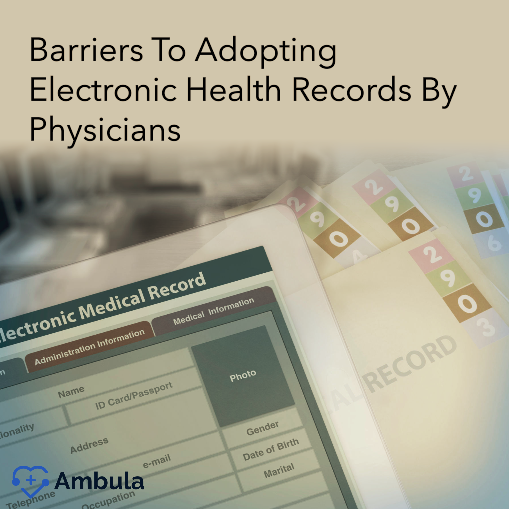Lack of Technical Competence
For many physicians, the complexities associated with modern technology create a considerable barrier to adopting Electronic Health Records (EHRs). Especially for those who are not inherently tech-savvy, maneuvering through digital interfaces and learning to operate new software platforms can be daunting. They tend to revert to traditional methods due to their familiarity and ease of use.
The gap in technical competence is mainly due to the insufficient inclusion of digital literacy in medical education. Moreover, the ever-evolving nature of technology necessitates continuous updates and learning, which many busy physicians might find taxing. Therein lies the need for a comprehensive, targeted, and ongoing training regimen that equips healthcare professionals with the necessary technical skills to handle EHRs.
A gradual and strategic training program can ease the transition, making physicians capable of tapping into the benefits of EHRs. Physicians with high technical competencies are likelier to favor EHR implementation, suggesting that cultivating digital literacy would greatly facilitate EHR adoption.
Cost of Implementation
The financial implications associated with EHR implementation form a significant obstacle to its adoption among physicians. The procurement of hardware and software required for EHRs and the costs of integrating them into the existing healthcare infrastructure are substantial expenses. Additionally, the finances needed for routine system maintenance and staff training present ongoing expenditures.
Many physicians balk at these high costs, which impact their willingness to transition to EHRs. The inability of smaller healthcare practices to bear this financial burden can greatly widen the gap in digitalization between larger hospitals and smaller clinics, adversely affecting overall healthcare outcomes.
Nevertheless, structured intervention in the policy can substantially reduce this financial barrier. This includes providing financial incentives, grants, or funding aimed specifically at EHR implementation. Financial assistance can considerably decrease the economic strain on healthcare providers, boosting the implementation rate of EHR systems.
Data Privacy Concerns
With the digitization of health information in EHRs, data security is pivotal in fostering trust among physicians toward these systems. Concerns about the breach of sensitive patient data, cyber threats, and unauthorized access often dissuade physicians from adopting EHRs.
Physicians, bound by their professional oath, are often skeptical about compromising the confidentiality of patient data. Therefore, robust security measures and legal protections are mandatory to guarantee information safety.
Technological strides in encryption, two-factor authentication, and blockchain technology can reduce the vulnerability of e-health record systems. Additionally, physicians need to be well informed about the system’s operations to build their trust in the secure handling of data. Transparency in the safety procedures and countermeasures should be maintained to allay data security fears, increasing the propensity for EHR implementation.
Compatibility and interoperability issues
EHR systems must seamlessly integrate with other healthcare applications and tools for optimal efficiency. However, the lack of standardization in the design of EHR systems can lead to interoperability issues, hampering the transition to digital records for many physicians.
Interoperability is particularly crucial in managing chronic diseases, health emergencies, or surgical procedures where health services are required from multiple providers. For example, lab results from different diagnostic centers should be able to sync with the EHR for continuity in patient care.
Failure to achieve these standards often results in a fragmented approach to patient care, reducing the benefits of EHRs. Hence, developing universal standards for EHR systems and enforcing these regulations are important factors in facilitating smoother interoperability and wider adoption of EHR systems among physicians.
Change Resistance
Resistance to change is an inherent human attribute not exclusive to the healthcare sector. The unfamiliarity and perceived disruption associated with transitioning to EHRs often spur physician resistance, inhibiting the adoption rate.
The transition to EHRs demands a shift from traditional healthcare practices and requires a certain adaptation period. Physicians might remain reluctant due to the apprehensions of longer consultation times, alterations in the workflow, and administrative hassles associated with the early stages of implementation.
Addressing this plight requires a strategic approach involving comprehensive training, constant feedback mechanisms, and incentives for early adopters. Adoption and proper usage of the new system should be reinforced through demonstrably improved patient outcomes and enhanced efficiencies in healthcare delivery.
Time Constraints
Another constraint contributing to physicians’ reluctance to adopt EHRs is the potential increase in time consumed towards EHR-related tasks. Physicians often feel EHRs can divert their focus from patient care to documentation and data entry, disrupting their workflow.
Physicians already working under considerable time pressure might view EHRs as an additional burden. Moreover, during the initial phase of EHR implementation, physicians may face a temporary slowdown in patient care as they adjust to the new system.
Making the software systems more intuitive and user-friendly, providing accessible technical support, investing time in a well-structured training program, and streamlining the implementation process could help mitigate this barrier. As physicians become more comfortable with the new system, they will gradually appreciate the long-term efficiency and time-savings associated with EHRs.
Legal Issues
There are a multitude of legal considerations and complications associated with the use of EHRs. Gaining informed consent, determining data ownership rights, and verifying the validity and integrity of electronic health data for legal purposes, among others, concern medical practitioners.
These concerns further make physicians cautious about deploying EHRs in their practice. Without a proper legal framework addressing these concerns, the widespread adoption of EHRs remains challenging.
A clear and comprehensive legal framework is paramount to address these challenges. It would provide the necessary assurance to physicians about the legal standing and ramifications of EHR implementation, thereby aiding the transition from paper to digital health records.





